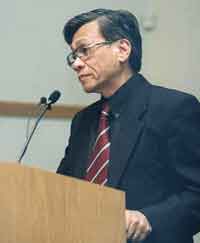 Liberation:
Is the World Social Forum at Porto Alegre, held successfully for a second year
in a row, emerging as a focal point for the anti-globalization movement?
Liberation:
Is the World Social Forum at Porto Alegre, held successfully for a second year
in a row, emerging as a focal point for the anti-globalization movement?
“The World Economic Forum is on its way out”
– Walden Bello
[Walden Bello, Executive Director, Focus on the Global South talked to Liberation about the second World Social Forum, its emerging contours and future direction]
 Liberation:
Is the World Social Forum at Porto Alegre, held successfully for a second year
in a row, emerging as a focal point for the anti-globalization movement?
Liberation:
Is the World Social Forum at Porto Alegre, held successfully for a second year
in a row, emerging as a focal point for the anti-globalization movement?
Walden Bello: I think there is no attempt to create a steering body of the anti-globalization movement and that is far from the intention of the organizers. There is some minimum coordination. There is an international body which is very open, people can come in without too much difficulty. It is a process, a very open process. Some would say that this is a weakness and some that it is the strength of it. I think it is more of a strength than a weakness. It is a very important type of process for people.
Liberation: What will be the future direction of the WSF process?
Walden Bello: There is going to be a smaller meeting here in Porto Alegre next year and then in 2004 it is going to be in India. There is momentum towards that at this point, so I think people are looking at the transfer from Brazil mostly in a positive fashion to see if we can replicate this in other areas of the world. There are certain conditions here in Porto Alegre that make it unique for the WSF. There is the Workers Party (PT) government at both the state and municipal level. That gives it access to a great deal of popular and political support and a significant deal of financial as well as physical resources for the Forum. Is this present in other sites around the world, like in India, where it is being proposed? Bringing together 70,000 people and from all around the world is a major task and I think in Porto Alegre it went very well. I am confident that after discussions, if the International Council decides to hold the event in a certain place, the decision will be well studied and taken with a great degree of consideration.
Liberation: Given the role played by the Brazilian Worker’s Party in successfully organizing the WSF why is there a phobia within the movement towards allowing political parties to formally participate in this event?
Walden Bello: Well I think, what people are concerned about is that the centre of gravity should be in civil society, people’s movements, mass movements, NGOs and the centre of gravity not be political parties. If the centre of gravity does lie with civil society organizations then there is not so much problem with certain types of political parties entering and becoming part of the process. I think that parties like the Workers Party which are innovative, have a popular mass base and are non-doctrinal in their approach are certainly likely to be welcomed into the Porto Alegre process. I would imagine that political parties, which are different, too could be brought in. I personally have no problem with political parties being part of the process, provided social movements remain at the centre of gravity of the process. And this is more a question of process rather than setting up two thousand guidelines on who can become a member of the Porto Alegre process.
Liberation: The WSF was set up as a counter to the World Economic Forum at Davos. What is the score so far?
Walden Bello: I think Davos and the World Economic Forum are on their way down. The fact that they have had to adopt some of our slogans of sustainable development, the fact that they are trying very hard to give capitalism a dimension of compassion shows it is in crisis. And in terms of the rivalry between the WEF and the WSF, the Porto Alegre process is on the ascendant. With the emergence of the Enron scandal and the Argentine collapse, there is certain global context in which the Porto Alegre process is moving forward. The crisis of legitimacy is back with a vengeance for the establishment. They may have gained some ground in the aftermath of September 11 but the scandals that are unfolding creates the conditions whereby we can regain the momentum for our movement.